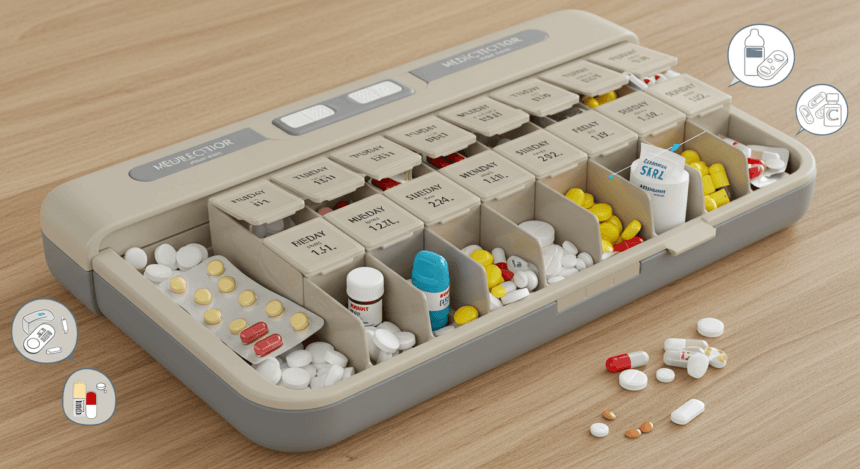An estimated 131 million people are on some form of medication in the United States. The Health Policy Institute at Georgetown University talks about this.
“The great majority of adults who have one of five common chronic conditions — diabetes, heart disease, hypertension, arthritis, and cancer — use prescription drugs. For example, 89 percent of people with arthritis and 98 percent of people with diabetes use prescription drugs. People with these conditions fill many prescriptions annually and have significant prescription drug expenditures. Adults with diabetes fill about 4 times as many prescriptions and spend about 4 times as much on prescription drugs as the general population. High prescription drug use may also reflect the fact that people have multiple chronic conditions,” the authors write.
Unfortunately, while medicine is important for many people, it also comes with risks.
We have talked about some of the risks in one of our previous articles. One issue we didn’t delve into was the risk of missed doses.
In the realm of healthcare, managing a medication routine can be a daunting task, leading to potential risks of missed doses and compromised treatment effectiveness. Simplified medication packaging is designed to mitigate these risks by organizing medications into an easy-to-follow format, enhancing medication adherence among patients. This user-friendly approach ensures that individuals are not overwhelmed by complex medication regimens, ultimately supporting better health outcomes. This can help them avoid the dangers of missing doses.
WebMD author Markham Heid talks about some of the risks of missed doses, so you can appreciate why this is so important.
“You may miss the best window of time. Some pain medicines for arthritis work best if you treat your symptoms before they start. Otherwise, your pain flare-ups may be harder to tamp down. If you have asthma, using your inhaler too late means you may not prevent irritated airways and the symptoms that follow. Your treatment might fail. If you don’t finish your antibiotics, your infection might last longer or even come back. Then you may need a longer drug course or more powerful antibiotics. Incomplete treatments also may make you resistant to antibiotics, so take all your prescribed pills even if you feel better,” Heid writes.
One of the key benefits of medication compliance packaging systems is their ability to transform the patient experience. These systems streamline medication management, reducing the cognitive load on patients and allowing them to focus more on their recovery. By clearly labeling doses and times, they provide clarity and reduce the confusion that often accompanies multiple prescriptions.
For patients, missed doses and forgotten medications can lead to setbacks in their health management journey. Through the integration of these specialized packaging solutions, patients are less likely to skip doses, as every unit is meticulously organized. If they miss a dose, they may have to report it to their doctor. This proactive approach supports adherence and empowers patients to take control of their health with confidence.
The Importance of Medication Adherence
Medication adherence is crucial for achieving positive outcomes in health management, particularly for individuals with chronic conditions. Consistent adherence can minimize the risk of medication errors, enhance patient experience, and alleviate burdens on caregivers. It also helps to prevent complications or hospitalizations, which can significantly reduce healthcare costs. Furthermore, improving adherence empowers patients to take an active role in their health, fostering a sense of control and improving overall well-being.
Understanding Medication Nonadherence
Medication nonadherence occurs when patients fail to take their prescribed medications as directed. This issue can stem from various factors, such as poor patient education, forgetfulness, or complex dosing schedules. For individuals managing chronic diseases, nonadherence can lead to worsening health conditions and increased medical costs. Studies have shown that simplified packaging, like pill organizers, can significantly improve medication compliance, reducing the likelihood of missed doses. By addressing the barriers of nonadherence, healthcare providers can improve patients’ health outcomes and support the long-term management of conditions like hypertension and diabetes.
Impact on Health Outcomes and Caregiver Burden
Medication nonadherence can severely impact health outcomes, leading to increased hospital visits and a higher risk of complications from untreated conditions. For caregivers, who often manage medication regimens, adherence is essential in reducing emotional and physical strain. Improved adherence helps decrease the need for emergency care and hospitalizations, as noted by various studies. This alleviates the burden on caregivers and minimizes healthcare expenses. Additionally, effective adherence contributes to a better overall patient experience, empowering individuals to take charge of their health and maintain a higher quality of life.
Simplified Packaging as a Solution to Medication Management
Simplified medication packaging effectively addresses common challenges like missed doses and medication errors. Organizing medications in an accessible manner promotes adherence and mitigates issues related to complicated regimens and communication barriers. Additionally, packaging that includes clear labeling and visual cues can help patients understand their treatment plan more easily, reducing confusion. This approach not only enhances patient compliance but also helps healthcare providers track and monitor medication usage more effectively.
How Pill Organizers Enhance Compliance
Pill organizers play a crucial role in ensuring that medications are taken consistently. These tools provide a straightforward way to sort medications by days and times, reducing the likelihood of skipped doses. With features like compartments designed for specific times of day, users can easily keep track of their medication regimen. This method significantly boosts medication adherence, as patients are less likely to forget or mix up their doses.
For individuals managing multiple prescriptions, pill organizers offer a visual reminder of what needs to be taken and when. This decreases the cognitive load on users and provides structure, making it easier to follow complex schedules. The visual simplicity of these tools proves effective in reinforcing good medication management habits.
Overcoming Language Barriers and Complex Regimens
Medication management becomes complicated when language barriers are present. Simplified packaging, such as blister packs labeled with symbols or color codes, addresses this by conveying important information in a universally understandable format. These features assist those with limited proficiency in the dispensing language, guiding them to the correct doses effortlessly.
In addition, complex regimens requiring multiple medications daily can be streamlined with effective packaging solutions. Each medication pack can detail important instructions or combine them into a single, easy-to-follow routine. This approach minimizes confusion, ensuring each step in the medication process is clear, safe, and accessible for all patients.
Conclusion
Simplified medication packaging plays a crucial role in enhancing adherence. By making medication routines clearer and reducing confusion, such packaging ensures patients are less likely to miss a dose.
The benefits of these packaging systems include easy-to-read labels and streamlined organization. This helps individuals, especially those managing multiple medications, maintain a consistent treatment plan.










